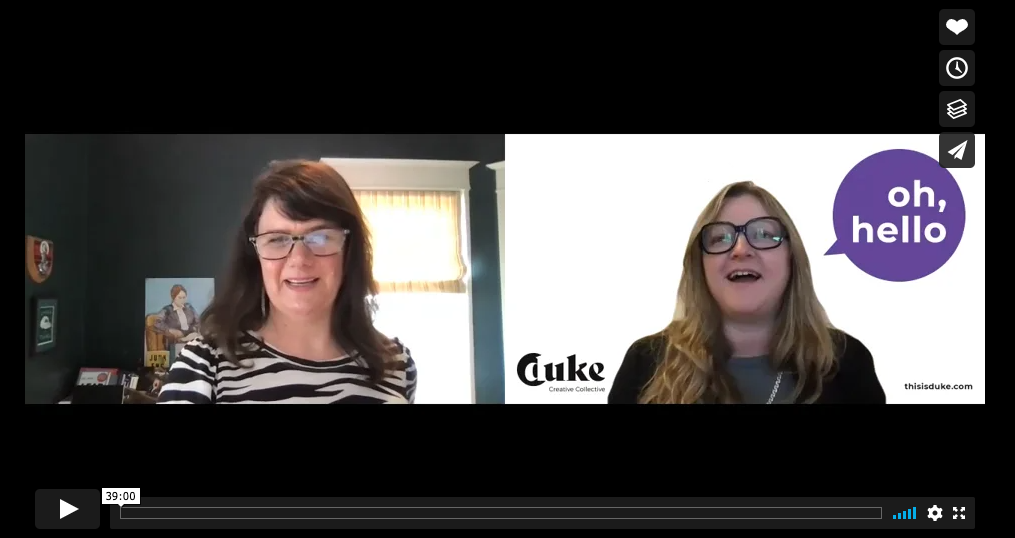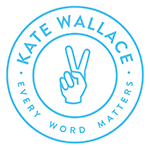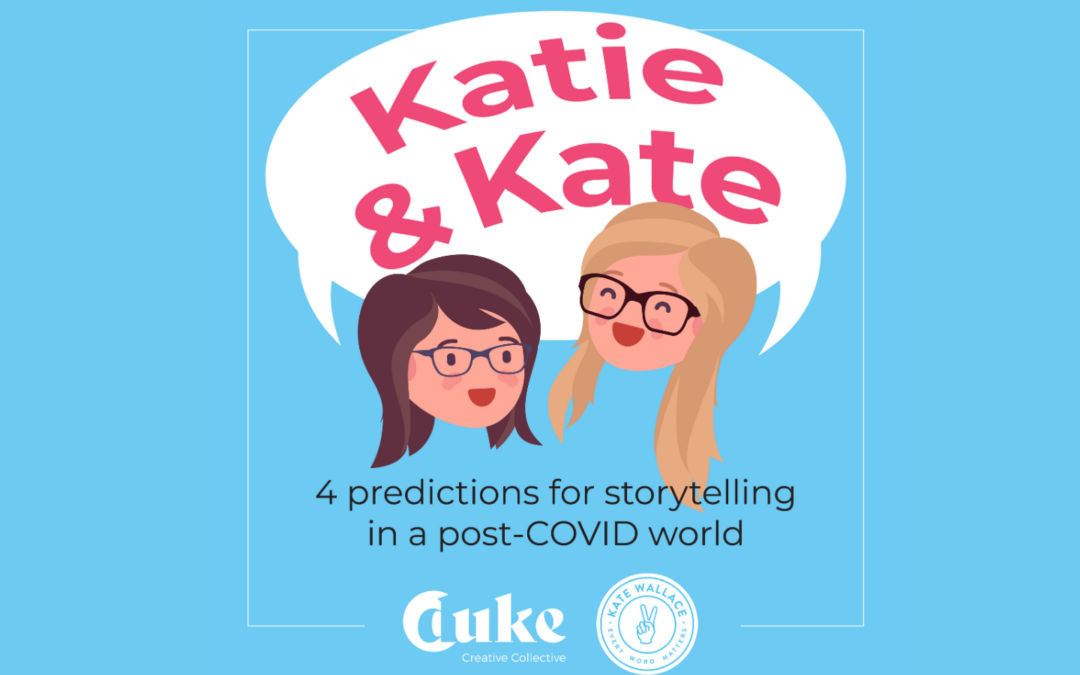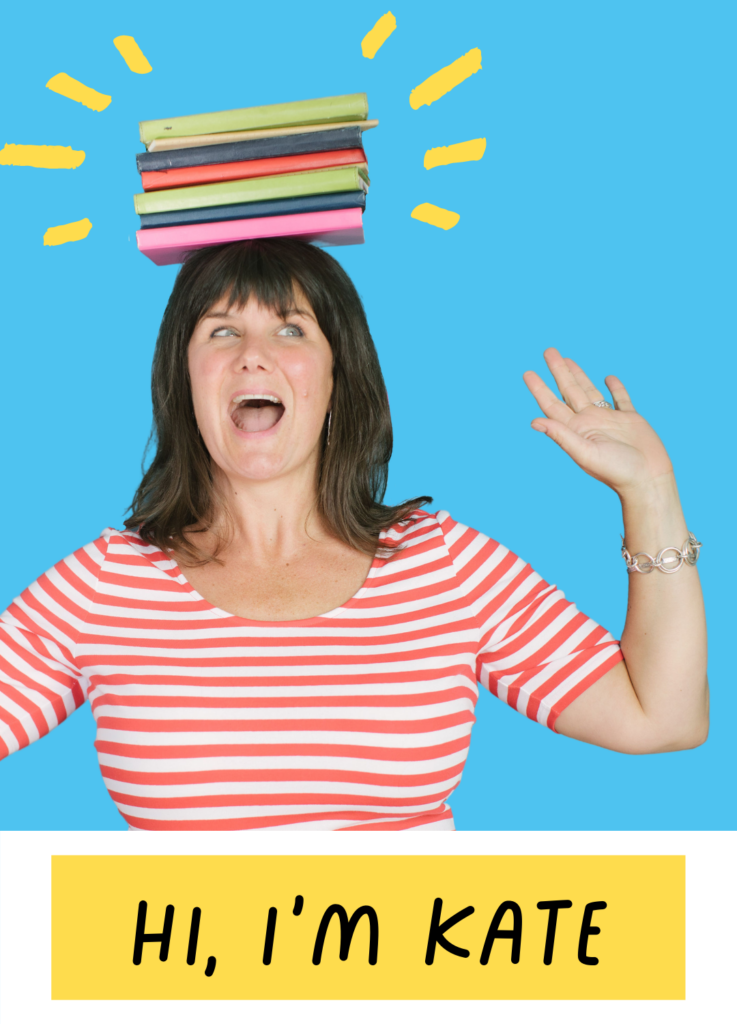Writing can be lonely work, so it was a lot of fun to meet up with Katie Bowden, a seasoned copywriter, to talk shop and share predictions on where we think brand storytelling is headed. I was so excited, I put a blouse on.
Katie is the president and chief creative officer of Duke, a fantastic agency here in Saint John, N.B. She’s a book author with a New York literary agent, so, basically, she’s a goddess to me.
Catch the video recording of our entire conversation by clicking here. We chat about the copywriting life, creativity and courage, the difference between showing and telling, and (a constant theme in our work) embracing what we don’t know. Here are the highlights of our chat.

Prediction #1: MORE Stories Focused On experiences
Katie B.: Okay, my first prediction is that we’re going to see a lot of our stories become focused on experiences.
I read something a long time ago that said storytelling is about imparting survival information. So, really, anything you read is teaching you how to survive better in this world. I think if we stretch that out to what’s happening in the world today, we’re going to see that a lot of our stories get focused on experiences.
I think if we stretch that out to what’s happening in the world today, we’re going to see that a lot of our stories get focused on experiences.
Katie Bowdon
I think we’ve already seen it with the 2020 Year in Review trend. There’s been lots of those sharing survival information of the past year, and best practices. But I think we’re going to see it going forward because we all lived this kind of vanilla existence for the past 12-13 months now, where we just haven’t done a lot of things.
And so I think a lot of the stories we’re going to see going forward will be experience-based. I don’t know whether that will translate into Hunter S. Thompson-stye gonzo journalism, but it might because experiences are inherently individual. I think with all of this upheaval, with identity politics and all of that stuff going on in the background, that the individual’s perspective is being valued more now than it ever has been. It’s a safe place where I get to say, “well, OK, this is what I think. I’m not making statements for other people, this is just my experience.”
So that’s my first prediction.
Kate W.: You’re right, because what stories do is create a spark. They activate that part of your brain that has mirror neurons, so you’re able to actually experience someone else’s life—and their stories—as though it’s your own. And that emotional, empathetic connection is why they’re so powerful. The cool thing about brand storytelling is once you get someone to that emotional state, that’s when people make decisions.
So that brings me to my first prediction.
Prediction #2: Originality is more important than ever
Kate W.: I feel like there’s been a lot of talk about storytelling in the marketing and branding worlds, and some people do a great job of it, and some don’t. I think part of what’s been missed is how specificity is so powerful and important. Sometimes there’s this tendency towards the safe story. The generic story. Replicating these types of stories you’ve seen before and people shy away from really finding their own voice, finding their own words.
It’s really looking around, paying attention to those details that a reporter would pay attention to, the five W’s, but also the sensory experience of this story we’re living.
There are some very practical, literally don’t-end-up-in-the-emergency-room-type stories. But also, specific stories of lived experiences tell us how to be ethical, how to be kind, how to be a good neighbour through COVID, living through huge social movements.
Kate Wallace
Like, how you talk about experiences as a survival mechanism. You can look at that in very practical terms: “I’m telling you this story about those red berries because if you eat them, you will die.” There are some very practical, literally don’t-end-up-in-the-emergency-room-type stories. But also, specific stories of lived experiences tell us how to be ethical, how to be kind, how to be a good neighbour through COVID, living through huge social movements.
Katie B.: Yeah, I think that that segues so nicely into my next prediction:
Prediction #3: Stories will be more values- based
Katie B.: My prediction No. 2 is that we’ll see more values-based stories. And I think that comes from a couple of places. It flows from that individual idea of “that’s my perspective,” but I think we’re also seeing the millennial generation coming into their careers, and research has shown that they as a group really want to know what a company stands for before they do business with them. Values are really high on the priority list of that group of people, and we know that culture and communications are defined by the up-and-comers, not so much the folks that are established.
Values are really high on the priority list of that group of people, and we know that culture and communications are defined by the up-and-comers, not so much the folks that are established.
Katie Bowden
That dovetails really nicely into what you were saying about brand, because those are some of the underpinnings of what brand actually is, and if you’re going to make your brand come to life, you have to walk the walk in terms of your values. Which brings you back around to experience — it’s all a big engagement picture. It’s you telling the story: you open that door, they become amenable to your messages, then fold that around the values. Then you’re building brand, but you’re also building that relationship with the person you’re telling the story to. I think that those relationships are what’s going to matter in the long run. It’s going to be more important to do it in a way that is authentic and not disingenuous.
Kate W.: And are there particular values that you would predict would be the most important or the most powerful in stories? Are we thinking about big universal values and themes in humanity or more niche ones that you see millennials caring about?
Katie B.: I think we’re seeing some of that with inclusion, equity, and the shop local community-type stories, those are certainly top of mind for people.
Prediction #4: stories are going to get a lot more personal and intimate
Kate W.: My second prediction is that stories will continue to become more personal and more intimate. With remote work, everyone came home, and all of a sudden, we saw a lot more of people’s personal lives, their home lives, their emotional lives. And things got a lot more casual. This year we saw people’s roots, and we saw their natural eyebrows when they couldn’t make it to the spa.
With remote work, everyone came home, and all of a sudden, we saw a lot more of people’s personal lives, their home lives, their emotional lives. And things got a lot more casual.
Kate Wallace
I saw this expression on Twitter about letting go of our ‘hard pants.’ And I feel like we’ve gotten rid of some of the ‘hard pants’ in storytelling and in content. I feel like people really love getting to know their colleagues and the brands they deal with in that more intimate way. Not just in Zoom meetings but in the kind of storytelling that they’re putting out there.
There’s something about a crisis that primes people to be more receptive. So, I’m not sure if perhaps there’ll be a bit of a correction as we get vaccinated and move into a post-pandemic world where people start to wear hard pants again and go back to the office. But I think that permission to let your hair down a bit and be a bit more informal, whether that was in tone or the kinds of topics you’re writing about, there was a lot of validation for that this year.
Being more casual and originality are inherently linked, and I see them connecting to the things you’re talking about, too, like experience.
Katie B.: Yeah, I have a saying, when I see somebody spouting off about what they think, I say, “that person is a card-carrying member of the Pontificati.”
Being a pontificator is easy and kind of fun, but showing up is harder because you have to actually do something. And that’s why I find engagement harder than advertising, for example, because you’re asking someone to get off the couch and do something and really connect as opposed to just look at an ad.
I think what we’re talking about here is real connection. Which is harder but more rewarding, and if that’s the legacy of this weird year, that’s kind of awesome. I think there’s probably a lot that can be done with that.
Kate W. Yeah, and if we do have that true kind of deeper connection to each other, then we’re also a lot more resilient. Not to get too corny about it, but we are stronger for it and, you know, you found your people or community.
Storytelling in a pandemic
Katie B.: When we first went into lockdown, I found that our clients responded with more courage and more creativity than they would normally show when it came to calling us up and asking for help. So that led to some really rewarding projects and some of those projects were story-based and experience-based. There’s an openness now to the requests; it’s not so much “Hey, I want this, that, and the next thing from you,” it’s more like, “I’ve got this issue, can you come to me with a solution?” Which is so much better.
Kate: I love that you said encouraging creativity and I’d have to echo that. I’ve noticed that all brands and companies have realized that if you haven’t been telling your stories, if you haven’t been actively marketing, and if you haven’t been putting yourself out there—now is the time. There was such urgency when people realized old shopping habits were changing, but the I think the brands that did the best actually were already storytelling.


